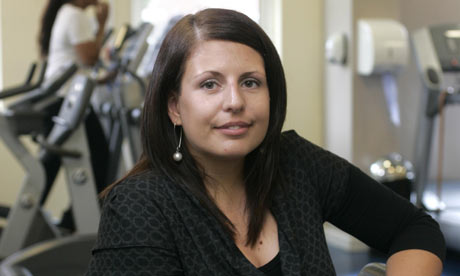The Bigger Picture: Social Entrepreneurs in the NHS
The first social entrepreneur to be 'embedded' in the NHS is looking at radical ways of tapping community and staff knowledge to tackle health inequalities and prevent illness. Owen Bowcott asks if this is the future

Eleanor Cappell: "We have health challenges as never before. This is an opportunity to empower people and motivate them." Photograph: Anita Maric
Eleanor Cappell is the only "social entrepreneur in residence" in the UK. She is attached to, and paid by, NHS Birmingham East and North, a primary care trust (PCT) eager to demonstrate its pioneering credentials. Her business-like manner and BlackBerry-tapping enthusiasm do not suggest that Cappell, 27, is fazed by the uniqueness of her role. However, the ambitions and aspirations of many social theoreticians and progressive politicians rest on her young shoulders. Internationally, she is in the vanguard of an emerging profession.
Cappell's post involves identifying health needs, then developing innovative, not-for-profit services so that they become economically sustainable. Her agenda is radical: economic growth through health provision.
The Saheli Women's Centre in Balsall Heath, south Birmingham, is an example of what she hopes to achieve. As a group, Saheli has grown up over 10 years, developing sports and social activities for its predominantly Asian community. The aim is to provide fitness training in its hi-tech gym and health promotion regimes, mainly for women but also for men.
"Saheli" is the Hindu traditional term for a woman's best friend on her wedding day, the one who keeps her in touch with her native village. The Saheli centre has helped women become more active, encouraging them out of their homes and involving them in community life. Most members – who pay £10 a month – are referred on by GPs for exercise aimed at preventing serious conditions such as diabetes, coronary heart disease and kidney disorders. Here, as elsewhere in the NHS, disease prevention programmes are being belatedly but enthusiastically adopted.
Cappell's interest is in exploring whether she can reproduce this invigorating scheme in Washwood Heath, a deprived district in her PCT area where unemployment has rocketed since the closure of the van manufacturer LDV.
The centre's managers, Naseem Ahktar and Shebina Gill, exude energy and imagination, but can the Saheli centre, which grew out of community activism, simply be copied and recreated – and franchised – in inner cities across the UK?
With two years already spent developing social firms and community groups across the city in her previous role as business development manager for third sector organisation the Initiative for Social Entrepreneurs, Cappell is ideally placed to take on the challenge.
Selling point
"The USP (unique selling point) of this scheme," she says, "is that it's overcoming barriers within the Asian community. We are looking for local women to run it in Washwood Heath."
Another scheme she hopes to develop is called Start Again Football, using sport and exercise as a means of combating depression. "The passion of the man who runs it stems from him seeing his brother being sectioned," Cappell says. "He felt he wanted to do something about it, so we are looking at the viability of existing schemes to become social enterprises".
From her office in a corporate NHS tower block looking out on one of Birmingham's many inner ring roads, Cappell insists that she is not a management consultant working by consensus. "It's much more than that. For me, it's about passion. A social entrepreneur is somebody who's passionate, but with a good business head on their shoulders. It's about inspiring and motivating others to join your cause – about generating income to sustain and grow businesses that make a difference to the environment and people."
Her other employer is the Young Foundation, the long-established London-based centre for social innovation, which selected and placed her in the PCT. The foundation is developing new partnerships through its Health Launchpad team, investing in projects that are "radical in approach and with the potential to transform society".
Two of Cappell's other lead projects could prove more controversial. They involve spinning off in-house NHS services into social enterprises – an idea championed by cabinet office minister Liam Byrne, whose Birmingham Hodge Hill constituency overlaps the PCT area. If successful, employees could be encouraged to leave the comfort of the NHS and work for independent, not-for-profit operations exposed to the unpredictable buffeting of market forces.
"A lot of other PCTs are looking at this," Cappell explains. "We have identified two teams that want to do things differently. We haven't had any discussions [with staff] yet. We are looking at how the projects might add value and improve patient outcome." But she admits: "Staff would be apprehensive about what change means for their employment rights and pensions."
Cappell believes that as many as 15 other social entrepreneurs in residence (Seirs) could eventually be attached to NHS trusts, and that there is no reason why they couldn't be embedded within local authorities.
Joop Tanis, her boss at the Young Foundation, says the Seir approach is that of a venture capital operation. "Eleanor has already looked at 50 to 60 projects, and four of them are real runners," he says. "We had a visit recently from representatives of the top 200 civil servants, who were very interested in the idea of placing an entrepreneur in a public sector organisation."
Andrew Donald, chief operating officer at Cappell's PCT, and a former management consultant himself, is convinced that social entrepreneurs will transform the way the NHS operates. "One of our concerns is to reduce health inequalities," he says. "To do that, we need to do radically different things than are being done in the NHS now.
Exciting bit
"We are trying to develop a preventive system. If people live longer, it reduces the cost of NHS interventions. The exciting bit for me is that, through commissioning new health services, we may create jobs.
"The way we are going to deal with this period of economic austerity is to commission lots of preventive services, and if it reduces the number of acute care interventions it will dramatically reduce the pressure on the NHS budget."
The theory is alluring. If the numbers add up, social entrepreneurs will enhance their reputations as visionary professionals – not only Seirs but also seers.
As Cappell says: "We have health challenges as never before. This is an opportunity to empower people and motivate them. They have energy and passion that money can't buy."
http://www.guardian.co.uk/society/2009/oct/07/social-entrepreneur-nhs-preventing-illness


0 Comments:
Post a Comment
<< Home